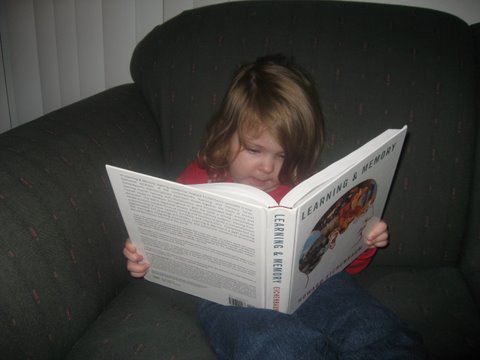Learning & Memory (PSYC 461/561)
|
|
|
Halloween Extra Credit, Fall 2018

Can you identify the psychology construct being exemplified by the costumes?
Announcements:
• There are currently several ACTIVE (Fall 2018) extra credit opportunities for students in Psychology 461 with Dr. Clark-Foos.
• We will be visiting the library (1212ML Mardigian) on September 25th, 2018. Bring a laptop or tablet if you have one. Please be prepared for this class by already selecting a topic (or several potential topics) to use for your literature review paper. We will be introducing the research article analysis at this class meeting as well and it will be due electronically on Oct. 17. This is a necessary first step prior to beginning your writing assignments. Please find a PDF of an older example of this Research Article Analysis assignment here.
• Halloween Dress-Up Extra Credit (10/31/2017): We are meeting the day before Halloween this semester!! I am offering you 10 points if you come to class dressed in your costume. I am also not asking that you get in full make-up or bring any attachments (fake weapons are, of course, discouraged). You can certainly go as elaborate or as simple as you'd like but I also don't want to see anyone in a t-shirt which reads "This is my Halloween costume." It is required, however, that your costume have some relevance to psychology (any field of psychology is fine) and that you are able to explain that relevance to the class if asked to do so. We will also take a picture of the group.
• Make a Mnemonic (Due One Week Before Final Exam): Up to 15 points are available if you create up to five separate mnemonics for material in this class. Ten points come directly from the five mnemonics and the additional five are possible if yours are voted (by the class) as funniest and/or most effective. Read more. (Note: Due date in attached file has not been updated for the current semester).
• I will award you ten extra credit points on any ONE assignment for visiting the writing center for help and providing proof (email from the Writing Center is typical) that you visited them for assistance.
Course Overview

The UMD course catalog states that this course will include "a consideration of major theories and research results related to learning and memory in humans and animals." The goal of this course is to understand theories about how human beings learn (encode), store, and retrieve (remember) all of the amazing things we are able to remember. To do this (and to gain historical perspective), we will discuss the research experiments which led to these theories, including extensive reserach with animals. To wit, it is important that you are able to read and understand psychological research.
Although several methods of instruction will be used in this course (including film and journal article discussions), lecture will be the primary means. You will read chapters in Gluck et al.'s (2016) Learning & Memory textbook in addition to reading and discussing several primary research articles. In addition to readings and class discussion, you will have several exams and one major research paper.
Notes
Please remember that these notes consist of an outline, at best, of what we will cover in each section of the course. All exams are heavily biased towards lecture, particularly your knowledge of terms and experiments not covered in the textbook. As such, you must attend class regularly to learn the information missing from the slides below.
01 - Introduction to the Study of Learning & Memory
(full slides)
02 - Neural Bases of Learning & Memory
(full slides)
• Exam 1
03 - Habituation and Sensitization
(full slides)
04 - Classical Conditioning
(full slides)
05 - Instrumental Conditioning
(full slides)
• Exam 2
06 - Episodic and Semantic Memory
(full slides)
07 - Skill Memory
(full slides)
• Exam 3
09 - Working Memory and Cognitive Control
(full slides)
10 - Emotional Learning & Memory
• Exam 4
11 - Social Learning & Memory
(full slides)
12 - Development & Aging
(full slides)
• Exam 5
In-Class Activities & Handouts
Phoemic Restoration Effect (Description, Example)
Multiple Phonemic Restorations (Description, Example)
McGurk Effect (McGurk & MacDonald, 1976)
Sample Stroop Test
Propositional Representation of a Boat (Kosslyn, 1973)
Analog Representation of a Boat (Kosslyn, 1973)
Program Demonstrating a Replication of Mental Rotation, courtesy of Dr. Dan Swift
Research Paper: Literaure Review or Research Proposal
See the syllabus for details.
Exam Materials
• Exam 1 Study Guide
• Exam 2 Study Guide
• Exam 3 Study Guide
• Exam 4 Study Guide
• Exam 5 Study Guide
Links
• American Psychological Association
• Association for Psychological Science
• Psychonomic Society
• Midwestern Psychological Association
• APA Formatting and Style Guide from Purdue University's Online Writing Lab (OWL)
|
|
|